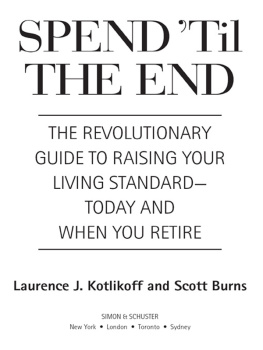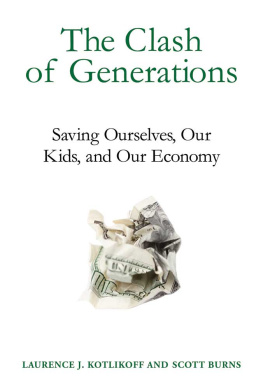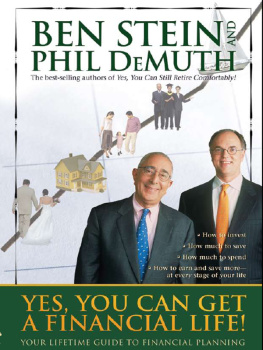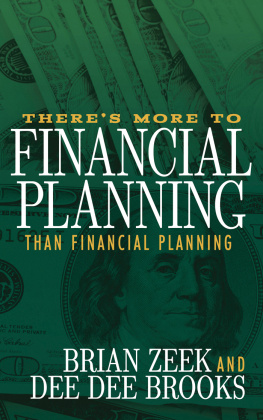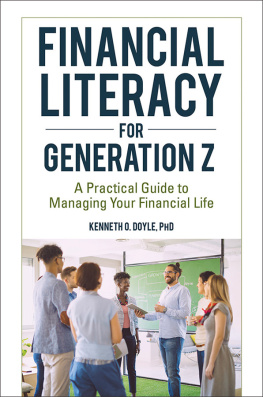ALSO BY LAURENCE J. KOTLIKOFF AND SCOTT BURNS
The Coming Generational Storm:
What You Need to Know about Americas Economic Future
ALSO BY LAURENCE J. KOTLIKOFF
The Healthcare Fix:
Universal Insurance for All Americans
Essays on Saving, Bequests, Altruism, and Life-cycle Planning
Generational Accounting:
Knowing Who Pays, and When, for What We Spend
This publication contains the opinions and ideas of its authors. It is sold with the understanding that neither the authors nor the publisher is engaged in rendering legal, tax, investment, insurance, financial, accounting, or other professional advice or services. If the reader requires such advice or services, a competent professional should be consulted. Relevant laws vary from state to state. The strategies outlined in this book may not be suitable for every individual, and are not guaranteed or warranted to produce any particular results. No warranty is made with respect to the accuracy or completeness of the information contained herein, and both the authors and the publisher specifically disclaim any responsibility for any liability, loss or risk, personal or otherwise, which is incurred as a consequence, directly or indirectly, of the use and application of any of the contents of this book.

Simon & Schuster
1230 Avenue of the Americas
New York, NY 10020
Copyright 2008 by Scott Burns and Laurence J. Kotlikoff.
All rights reserved, including the right to reproduce this book or portions thereof in any form whatsoever. For information address Simon & Schuster Subsidiary Rights Department,
1230 Avenue of the Americas, New York, NY 10020.
SIMON & SCHUSTER and colophon are registered trademarks of Simon & Schuster Inc.
Library of Congress Cataloging-in-Publication Data
Kotlikoff, Laurence J.
Spend til the end: the revolutionary guide to raising your living standardtoday and when you retire / by Laurence J. Kotlikoff and Scott Burns.
p. cm.
Includes bibliographical references and index.
1. Finance, PersonalHandbooks, manuals, etc. I. Burns, Scott II. Title.
HG179.B849 2008
332.024dc22 2007051823
ISBN-13: 978-1-4165-7967-0
ISBN-10: 1-4165-7967-2
Visit us on the World Wide Web:
http://www.SimonSays.com
To Dayle and Carolyn,
with our deep love and affection
Acknowledgments
We thank our oustanding editor, Bob Bender, and our terrific agent, Alice Martell, for helping us make this book a reality. We also thank our many friends and colleagues in the academic, journalism, and financial planning communities for their encouragement and suggestions.
Larry Kotlikoff wishes to express his deep appreciation to Boston University for a quarter centurys support of his research in economics.
Contents
Introduction:
The Three Commandments of Economics
SPEND Til THE END
Introduction:
The Three Commandments of Economics
THIS BOOK MAY change your life. If you follow its simple prescriptionsthe surprising rules of true financial planningyoull live a more relaxed and happier life. Youll do so by achieving a higher and more stable living standard and a better lifestyle.
These are big claims for a small book. But we arent offering the revolutionary solution of the moment. This isnt the miracle diet of the week or the sex trick of the month. It isnt even the six mutual funds guaranteed to fix your future. Instead were providing something with a great pedigree: an economics-based, three-part prescription for personal financial health:
- Maximize your spending power.
- Smooth your living standard.
- Price your love.
Economists have been developing and refining their approach to financial planning for over a century. But few people know about it, and for good reason: its been impossible to implement this refined approach from a computational perspective. But times change, and today PCs can calculate in seconds what used to take mainframes weeks. With these new power tools, economists can finally move from describing financial problems to prescribing solutions. In particular, they can now help people improve both their financial and personal lives by finding them a higher, smoother, and more rewarding spending path.
Higher, smoother, more rewarding spending sounds good. So whats the catch?
There is no catch.
Maximizing your spending power doesnt require working yourself to the bone or even working an extra hour. It means making a host of decisions regarding education, career, job, location, housing, mortgage, retirement account, insurance, portfolio, tax, and Social Security, among others, that provide you more moneypotentially a lot more moneyto spend for the same effort.
Take the decision of whether to collect a smaller Social Security retirement benefit starting at age sixty-two or a larger one starting at a later age. Making the right choice doesnt take any more time or effort than making the wrong one, but the consequences for your living standard can be spectacular. The same holds for choosing between jobs, mortgages, retirement accounts, and so on.
Smoothing your living standard means spreading your spending power evenly over time, so you never need worry about running out. It doesnt mean starving now to gorge later or vice versa. Economists call this spreading of your spending power over time consumption smoothing. It is based on the law of diminishing returnsthe well-known proposition that you can have too much of a good thing. Six-year-olds have this down. Put them in front of a plate of cupcakes. Theyll inhale the first, gulp down the second, struggle through the third, and then save the rest for tomorrow. In making this spending/ saving decision, six-year-olds are smoothing their consumption. They are trying to even out their pleasure from consuming today, when times are good (Dads been shopping), with their pleasure from consuming tomorrow, when times are bad (Moms going shopping).
Smoothing your consumption also means protecting your living standardmaking sure it stays relatively steady in good and bad times. For six-year-olds, living-standard protection means hiding the remaining cupcakes from Mom. For us grown-ups, it means inoculating our living standard against adverse changes in income, health-care costs, taxes, government benefits, and inflation, and making sure that risky investments are truly worth the gamble.
Pricing love doesnt mean selling your firstborn for ready cash. It means knowing what it costs, measured in terms of your living standard, to do things that youd really love to do. These include taking a wonderful but low-paying job, retiring early, having kids, buying a vacation home, getting divorced, signing up for an Alaska cruise, moving to Arizona, and contributing to charity, among many other things.
Pricing your passions is critical to getting the most out of your spending power. Imagine having to buy the weeks groceries at a market that doesnt post prices. Youd surely end up spending too much on things you thought were cheap but were actually expensive, and perhaps too little on things you thought were expensive but were actually cheap. Youd be spending blind and buying too little love for your money.
Maximize your spending power; smooth your living standard; price your love these are the Three Commandments of economics. Although the economics lingo may be foreign, the concepts are familiar. We all try to follow these rules most of the time. Just consider the kinds of financial questions we ask:
- Does contributing to my 401(k) pay?

